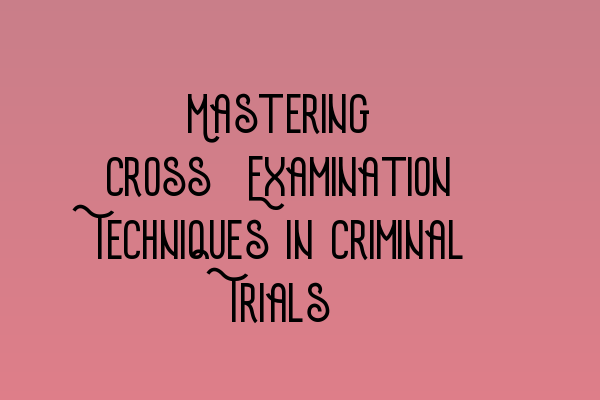Mastering Cross-Examination Techniques in Criminal Trials
Welcome to the SQE Criminal Law & Practice Law UK blog! Today, we dive into the art of cross-examination techniques in criminal trials. Cross-examination is a critical skill for any criminal law practitioner, as it can make or break a case. It requires a combination of legal knowledge, strategic thinking, and effective communication. In this article, we will guide you through the process of mastering cross-examination techniques to enhance your courtroom performance.
The Importance of Cross-Examination
Cross-examination serves as a tool for challenging the credibility and accuracy of witness testimony. It allows the defense to expose inconsistencies, biases, and errors in the prosecution’s case. This technique is crucial in criminal trials as it can cast doubt on the prosecution’s evidence and create reasonable doubt in the minds of the jury.
By cross-examining witnesses effectively, defense solicitors can strengthen their client’s case, weaken the prosecution’s arguments, and potentially secure an acquittal.
Preparation is Key
Before diving into cross-examination, thorough preparation is essential. Start by reviewing the witness statements, police reports, and all other relevant documents. Identify the key issues, inconsistencies, and weaknesses in the prosecution’s case. This will help you craft a strong cross-examination strategy.
Prepare a list of open-ended and leading questions that will elicit favorable answers for your client. Anticipate possible objections from the prosecution and have responses ready. Remember, preparation is crucial for successful cross-examinations.
Building Rapport
Building rapport with the witness is essential to extract information and control the courtroom dynamic. Establish a respectful and professional demeanor, maintain eye contact, and speak clearly and confidently. This will help create a comfortable environment for the witness to reveal potential weaknesses in their testimony.
Listen carefully to the witness’s answers and adapt your questioning accordingly. Use active listening techniques, such as paraphrasing their responses, to show that you are engaged and interested. Building rapport increases the likelihood of obtaining favorable information during cross-examination.
Effective Questioning Techniques
During cross-examination, the choice and phrasing of questions are crucial. Here are some effective questioning techniques to employ:
- Leading Questions: Use leading questions to control the witness’s responses and gently guide them to provide the desired answer. For example, “Isn’t it true that you were not present at the scene of the alleged crime?”
- Impeachment Questions: Challenge the credibility of the witness by asking questions aimed at revealing inconsistencies or contradictions in their testimony. For example, “Isn’t it true that you previously stated to the police that you weren’t sure about the perpetrator’s identity?”
- Compound Questions: Avoid asking compound questions that contain multiple inquiries. Instead, break them down into simpler, single-issue questions for clarity and impact.
- Hypothetical Questions: Use hypothetical questions to test the witness’s knowledge, perception, or memory. This technique can be particularly effective in challenging expert witnesses.
Controlling the Witness
Controlling the witness is crucial during cross-examination. By using a combination of leading questions, pacing, and effective listening, you can ensure that the witness stays on track and remains focused on your line of questioning.
Avoid allowing the witness to go off-topic or provide lengthy narratives. Politely interrupt and redirect their answers to maintain control and extract the necessary information for your case.
Adapting to Different Witnesses
Every witness is different, and as a skilled practitioner, you must be adept at adapting your cross-examination techniques to suit each witness’s personality and demeanor.
Some witnesses may be hostile or evasive, while others may be timid or easily swayed. Tailor your approach accordingly to counteract their tendencies and elicit the desired information or concessions.
Practice Makes Perfect
Lastly, the key to mastering cross-examination techniques is practice. Participate in mock trials, engage in peer discussions, and seek feedback from experienced practitioners. Enhance your skills by referring to our related articles:
- SQE Sample Papers: Practice for Exam Success
- Focus Areas in SQE1 and SQE2: Mastering Key Concepts
- Adjusting Your SQE Strategy Based on Mock Performance
- Practical Legal Skills (PLS) Mocks: Boosting Your Performance
- Peer Discussions Post-Mock: Learning from Collaboration and Feedback
By consistently practicing your cross-examination skills, integrating feedback, and leveraging the resources provided, you will steadily enhance your performance and become a master in the art of cross-examination.
We hope you found this article insightful and that it will assist you in your criminal law journey. Stay tuned for more informative content from SQE Criminal Law & Practice Law UK.
